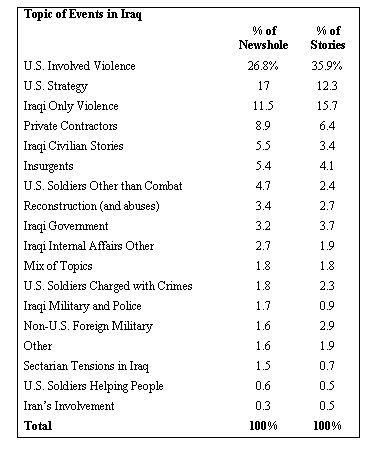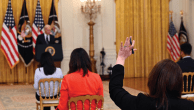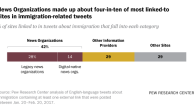If the examination of the theme got at the “message” inside stories, the basic subject matter of stories—what were they generally about—tells us something else. What percentage of stories dealt with American military, vs. Iraqi civilians, insurgents, etc.?
In the content studied here, more than half of the coverage—whether measured in stories (53%) or newshole (51%)—related to U.S. activities. The largest share of this was violence that involved U.S. military, followed by stories involving the military that was non-violent, such as military strategy, and then stories about U.S. soldiers.

This finding also dovetails with the survey of journalists covering the situation in Iraq. The journalists surveyed in Iraq gave high marks to their coverage relating to U.S. troops. Eight in ten rated reporting on that topic as excellence or good. Much of the ability to provide solid reports on these events is likely tied to the active embed program there. As one editor at a broadcast outlet commented, “The press has been well placed and well equipped to cover the war from the point of view of the American military.”

The amount of coverage that was U.S. focused rises to roughly 60% if one adds the reporting about the role of private contractors and security firms in Iraq. That topic made up 9% of the coverage as measured in newshole—or 6% of the stories—most of which involved U.S.-based companies working for the U.S. government.
Violent incidents involving Iraqis only, without any U.S. presence filled 11% of the newshole (and 16% of the stories, a sign that many of these stories were quite short).
And 5% of the coverage (3% of stories) was about the daily life of Iraqi citizens. The difference between stories and newshole suggests that more of these stories were longer.
This, too, dovetails with the survey of journalists covering the war. The topic area that journalists in our survey gave the lowest marks was coverage of the lives of ordinary citizens. “There are too few reports that include Iraqi citizens—not Green Zone politicians but regular folks,” offered on journalist.
Stories about insurgents made up 5% of the newshole (4% of stories) and stories about reconstruction for the country 3% of the newshole (and 3% of stories).
The coverage of the Iraqi government accounted for 3% of coverage (and 4% of the stories).
One twist in these findings is the fact that stories about private contractors roughly tripled the time or space devoted to the Iraqi government. But the vast majority of that coverage occurred in just two months, September and October, after the controversy over the shooting involving Blackwater.




